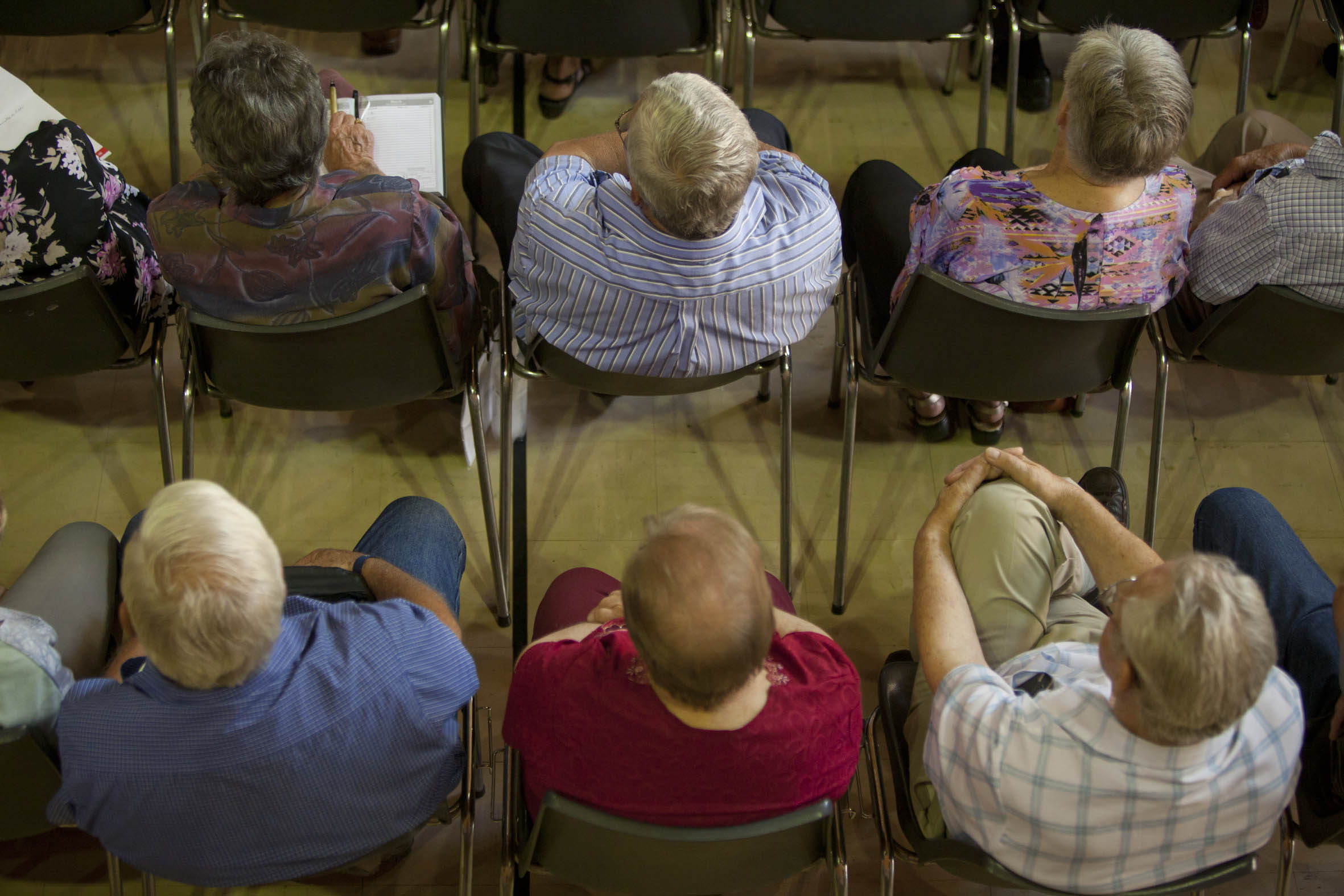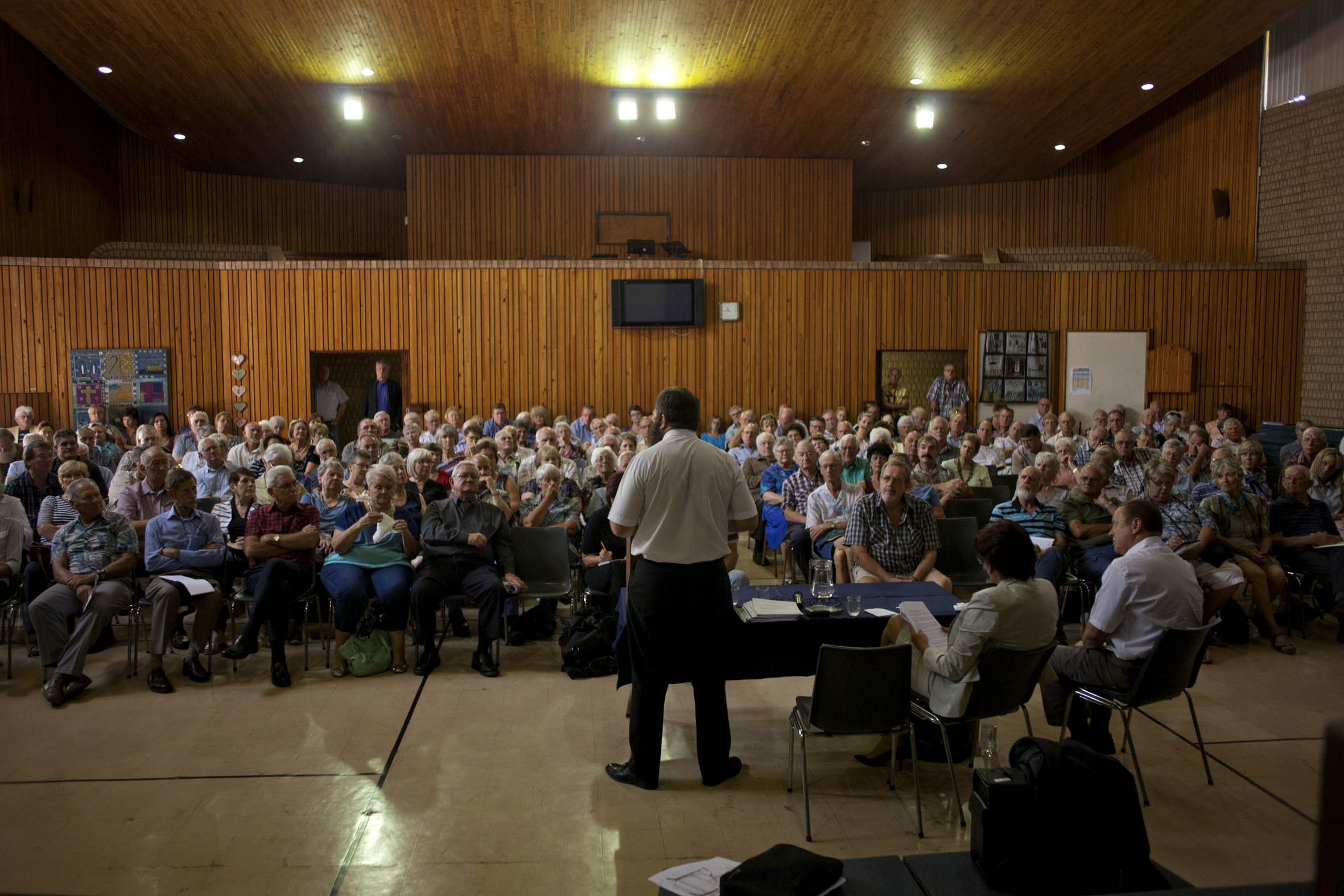Former financial broker Deon Pienaar tells investors who lost their money in property syndication schemes that it was not the fault of brokers but the Reserve Bank’s auditing firm.
Five years ago he had set off on a mission to find the truth, said the man with the luxuriant beard and the wide eyes. He was speaking to about 100 people, as a money collection shoebox made the rounds.
With strength drawn from the Lord he had found the facts, and with the help of their prayers — and their voluntary donations — he would wield those facts to their benefit.
“What do I want to achieve? I want to make no compromises,” former financial broker Deon Pienaar told his audience last Tuesday. Then he diverged slightly from the usual approach of most preachers.
“We all know properties have escalated. Give our properties back, that’s what we want,” he said, to nods of agreement from the almost exclusively white and grey-haired listeners.
The wallets opened and notes dropped into the slot of the collection box.
The allusions to faith, and belief, and the religiously themed decorations of the hall in Pretoria notwithstanding, Pienaar was selling neither salvation nor earthly wealth derived through divine favour. Instead he was promising his audience — investors in failed property syndication schemes — that he would help them to recover their money. All their money, with interest.
Property syndication companies marketed direct investments in projects that were supposed to generate rentals or other revenue, such as shopping centres and hotels. This amounted to a loan investors made to a company, which in turn lent it to another company to pay for a building, though not always without taking profits or administrative fees first — and not always without using the money “invested” to pay dividends to previous investors. The most notorious of these was Sharemax.
Over time, the investments were increasingly distanced from the physical property so that Sharemax investors were sold what was described as “an unsecured subordinated interest rate acknowledgment of debt linked to a share”.
After years of hearing that their investments, often desperately needed to fund their retirement, had either been stolen through pyramid schemes or had dwindled in value, the pitch got their attention — if not their universal belief.
“I won’t be holding my breath,” one attendee said after the two-hour meeting. Then he smiled a gallows-humour smile. “At my age you are liable to die if you do that kind of thing.”

Sharemax investors, mainly pensioners wanting to finance their retirements, at the meeting addressed by Deon Pienaar at Skuilkrans NG Church in Pretoria on March 14 2017 about his plan to take the matter to court. (Photos: Oupa Nkosi, M&G)
Pienaar used to be a financial broker, making a living from the commissions on the sale of investment products. Those included debentures in Realcor, a Cape Town property syndication outfit that collapsed between 2009 and 2011.
Most of those at Pienaar’s session had invested in Sharemax, the biggest of the property syndications that mushroomed in the early 2000s, but the cause of their distress was the same, Pienaar told them. Property syndication had been too successful in making ordinary people money so it was shut down. Banks and insurance companies could not compete with the likes of Sharemax so they went to the Reserve Bank, which pulled the plug.
That is a remarkable reading of a history that includes recent findings of activity closely resembling those of Ponzi schemes and historical findings of deep irregularities in the conduct of such schemes.
The details are often as complex as the baroque financial engineering employed by the companies in question, but sometimes the results achieved were clearly impossible. Sharemax, for instance, managed to pay investors returns drawn from the revenues generated by a shopping centre before it had been completed.
Allegations of this sort were merely intended to distract from the illegal and sometimes fraudulent activities behind the shutting of property syndication companies, Pienaar said.
In several rulings, the ombud for financial services providers has held brokers such as Pienaar personally liable to repay clients for their losses, on the grounds that the brokers failed to do due diligence investigations of the schemes they sold to clients — or at least not until they had pocketed their unusually lucrative commissions.
But going that route would be a mistake, Pienaar warned. “The brokers were not the guilty parties in this terrible tragedy,” he said.
Nor are the former heads of the schemes to be blamed, he added. He is working closely with Deonette de Ridder, who headed Realcor, and it is with her help that he uncovered the truth.
“Today I know what happened,” said De Ridder, in her role as a support act to Pienaar’s roadshow. What happened is again complicated, but comes down to the Reserve Bank lying and possibly cheating on the way to shutting down her company.
She will name names in court papers, she promised, because she now knows who was behind an “orchestrated hostile takeover” of her company.
De Ridder said the Reserve Bank is refusing to hand over documents that would allow her to defend herself and help her former investors. But she does not hold the bank responsible directly. She blames the auditors and accountants appointed by the bank to take over the administration of Realcor during an probe into whether it was contravening the law by acting as a deposit-taking institution.

Deon Pienaar (centre) and Deonette de Ridder (seated) have made similar claims about the Reserve Bank and its auditors and accountants before.
Pienaar and De Ridder have made similar claims before. In a 2014 case before the high court in Cape Town, Pienaar and a fellow broker proactively sought to indemnify themselves against claims to the ombud. Damages should instead be sought from the auditing firm PwC, they contended — although the Reserve Bank was also at fault.
The bank and “its managers had been acting in a cavalier, nonchalant manner towards the investing public under the pretext that they were acting in the interest of the investing public”, the two brokers argued.
PwC, judgment in the case shows, implied that the guilt may lie elsewhere. In one case, it told the court, boxes of Realcor documents it had sealed as evidence but left in the company’s offices were broken open and the documents spirited away. PwC also claimed it had received word that De Ridder had instructed staff “to install a virus on the data server which would have the effect of destroying and corrupting the data”.
That court application was dismissed, with costs awarded against Pienaar and his colleague.
Such claims and intimidation would only continue, Pienaar warned on Tuesday, because De Ridder had “stuck her head above the parapet”.
As for his own legal failings to date, Pienaar dismissed those as “school fees”. Now that he has the facts, the truth, he believes he is unstoppable.
He intends to seek a “declaratory order” from the high court that would determine how the property syndication companies breached the law, and from when. Then, in some way he did not explain, he would set about unscrambling the egg.
This way, he said, none of the investors would have to gamble anything at all. “It is my time, it is my money, it is my risk,” he said. “Nobody has to contribute anything. I take the risk in full. I bring the court actions in my name.”
Anyone who wished to contribute would be welcome, he said, but “if you don’t support me, I won’t exclude you”.
That drew a round of applause that halted the donations shoebox on its rounds, but only briefly.